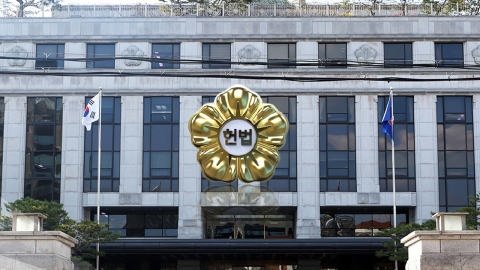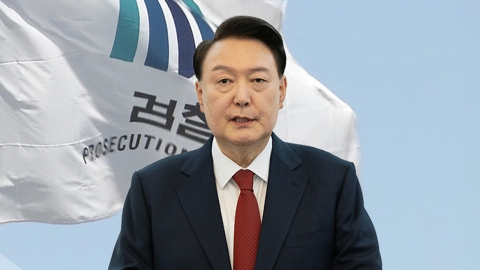South Korea's economy is forecasting a 'dark future'..."The situation is worse than when Park was impeached" [Y transcript]
■ Host: anchor Lee Jung-seop, anchor Cho Ye-jin
■ Starring: Seo Eun-sook, professor of economics and finance at Sangmyung University
* The text below may differ from the actual broadcast content, so please check the broadcast for more accurate information. Please specify [YTN News START] when quoting.
◆ Anchor: There have been two impeachment decisions in the past. There were many articles comparing the situation at that time with the economic situation. I think it would be good to compare the growth rate and prices.
◇ Seo Eun-sook: It's very different from then. The current economic situation is very different from the two impeachment cases, as explained earlier, but when former President Roh Moo Hyun was impeached in 2004, the Chinese economy was growing rapidly. Because one of the biggest reasons why we continue to see changes in China's economy is that China accounts for the largest portion of our export structure. So, if the Chinese economy grows rapidly or improves, the GDP growth rate and so on will increase as the proportion of exports increases, and if the Chinese economy slows down or this happens, we will be affected a lot.
So at that time, the Chinese economy was growing rapidly and the global economy was very booming. Of course, after the impeachment, there was temporary uncertainty, but the economic growth rate itself did not cause problems. When former President Park Geun Hye was impeached in 2017, the semiconductor industry was very strong and it was a global IT boom, so it was particularly affected in the early stages, but it was okay after that. As far as I know, the impeachment of former President Park Geun Hye was December 9, 2016. At that time, it grew 0.8% in the fourth quarter of 2016 compared to the previous quarter.
After that, in the first quarter of 2017, compared to the previous quarter, the growth rate was 1.1%, but in the case of the Yoon Suk Yeol government, the current third quarter is 0.1%. It's a very low level. Then, according to the Bank of Korea's estimate, the fourth quarter is also expected to be around 0.5%, but we all expect that this will also fall a little. In the case of inflation, it was 1.5% in the fourth quarter of 2016. This was 1.1% in the first quarter of 2017. So the inflation rate was very low.
So, for example, the Bank of Korea's use of easing monetary policy to eliminate uncertainty after impeachment was not too burdensome for prices. However, during the Yoon Suk Yeol administration, the Bank of Korea now expects 2.1% and the fourth quarter to be 1.6%, but the exchange rate is rising very much now. If the exchange rate rises very much, it acts as upward pressure on prices. So I think it'll probably go up a little more. So the bigger problem is that the situation was a little different from that of impeachment at the time, and now, as problems arose after the declaration of an emergency martial law, it has greatly lowered international trust and led investors to continue to wait and see the stock market.
So we can say that the part that has greatly damaged international trust is that we are currently in a bad situation by adding this to the long-term low-growth trend.
◆ Anchor: And if you look at the comparison, I wonder what the exchange rate flow itself was like, as you mentioned earlier.
◇ Seo Eun-sook: In December 2016, the impeachment motion against President Park Geun Hye was proposed and passed by the National Assembly, and the won-dollar exchange rate was about 52 won in the short term. So, as of December 9, 2016, it recorded 1165.50 in terms of trading. But back then, it was around 1,100 won. Of course, the volatility of the exchange rate naturally appeared, but the decision to cite the impeachment was later made by the Constitutional Court, and uncertainty was resolved and the exchange rate stabilized again. Of course, December 14, 2024, is closed, so there is no official data, but the won-dollar exchange rate on Friday is 1435.5 won per dollar.
Compared to then, there is a big difference. As of December, the exchange rate usually hovers around the 1430 won range, so the exchange rate level has risen a lot compared to then. The problem is that the exchange rate has risen a lot because of impeachment, and the volatility has increased. Due to short-term uncertainty, the reason why it reached the 1,400 won range is that not only uncertainty but also global economic conditions, the trade environment, and the economic low growth trend that we discussed earlier are compounding now, and this volatility is increasing with the exchange rate already high.
Excerpt from the conversation: Jung Eui-jin, editor of the digital news team
※ 'Your report becomes news'
[Kakao Talk] YTN Search and Add Channel
[Phone] 02-398-8585
[Mail] social@ytn.co.kr
■ Starring: Seo Eun-sook, professor of economics and finance at Sangmyung University
* The text below may differ from the actual broadcast content, so please check the broadcast for more accurate information. Please specify [YTN News START] when quoting.
◆ Anchor: There have been two impeachment decisions in the past. There were many articles comparing the situation at that time with the economic situation. I think it would be good to compare the growth rate and prices.
◇ Seo Eun-sook: It's very different from then. The current economic situation is very different from the two impeachment cases, as explained earlier, but when former President Roh Moo Hyun was impeached in 2004, the Chinese economy was growing rapidly. Because one of the biggest reasons why we continue to see changes in China's economy is that China accounts for the largest portion of our export structure. So, if the Chinese economy grows rapidly or improves, the GDP growth rate and so on will increase as the proportion of exports increases, and if the Chinese economy slows down or this happens, we will be affected a lot.
So at that time, the Chinese economy was growing rapidly and the global economy was very booming. Of course, after the impeachment, there was temporary uncertainty, but the economic growth rate itself did not cause problems. When former President Park Geun Hye was impeached in 2017, the semiconductor industry was very strong and it was a global IT boom, so it was particularly affected in the early stages, but it was okay after that. As far as I know, the impeachment of former President Park Geun Hye was December 9, 2016. At that time, it grew 0.8% in the fourth quarter of 2016 compared to the previous quarter.
After that, in the first quarter of 2017, compared to the previous quarter, the growth rate was 1.1%, but in the case of the Yoon Suk Yeol government, the current third quarter is 0.1%. It's a very low level. Then, according to the Bank of Korea's estimate, the fourth quarter is also expected to be around 0.5%, but we all expect that this will also fall a little. In the case of inflation, it was 1.5% in the fourth quarter of 2016. This was 1.1% in the first quarter of 2017. So the inflation rate was very low.
So, for example, the Bank of Korea's use of easing monetary policy to eliminate uncertainty after impeachment was not too burdensome for prices. However, during the Yoon Suk Yeol administration, the Bank of Korea now expects 2.1% and the fourth quarter to be 1.6%, but the exchange rate is rising very much now. If the exchange rate rises very much, it acts as upward pressure on prices. So I think it'll probably go up a little more. So the bigger problem is that the situation was a little different from that of impeachment at the time, and now, as problems arose after the declaration of an emergency martial law, it has greatly lowered international trust and led investors to continue to wait and see the stock market.
So we can say that the part that has greatly damaged international trust is that we are currently in a bad situation by adding this to the long-term low-growth trend.
◆ Anchor: And if you look at the comparison, I wonder what the exchange rate flow itself was like, as you mentioned earlier.
◇ Seo Eun-sook: In December 2016, the impeachment motion against President Park Geun Hye was proposed and passed by the National Assembly, and the won-dollar exchange rate was about 52 won in the short term. So, as of December 9, 2016, it recorded 1165.50 in terms of trading. But back then, it was around 1,100 won. Of course, the volatility of the exchange rate naturally appeared, but the decision to cite the impeachment was later made by the Constitutional Court, and uncertainty was resolved and the exchange rate stabilized again. Of course, December 14, 2024, is closed, so there is no official data, but the won-dollar exchange rate on Friday is 1435.5 won per dollar.
Compared to then, there is a big difference. As of December, the exchange rate usually hovers around the 1430 won range, so the exchange rate level has risen a lot compared to then. The problem is that the exchange rate has risen a lot because of impeachment, and the volatility has increased. Due to short-term uncertainty, the reason why it reached the 1,400 won range is that not only uncertainty but also global economic conditions, the trade environment, and the economic low growth trend that we discussed earlier are compounding now, and this volatility is increasing with the exchange rate already high.
Excerpt from the conversation: Jung Eui-jin, editor of the digital news team
※ 'Your report becomes news'
[Kakao Talk] YTN Search and Add Channel
[Phone] 02-398-8585
[Mail] social@ytn.co.kr
[Copyright holder (c) YTN Unauthorized reproduction, redistribution and use of AI data prohibited]
Editor's Recomended News
-
[On-site video+] Han Dong-hoon said, "I will step down as the party leader..."I'm sorry to all the people".
![[On-site video+] Han Dong-hoon said, "I will step down as the party leader..."I\'m sorry to all the people".](//image.ytn.co.kr/general/jpg/2024/1216/202412161033595448_h.jpg)
-
[On-site video+] "Two years in prison" Cho Kuk said, "I don't agree with the court's ruling, but I accept the Supreme Court's sentence."
![[On-site video+] "Two years in prison" Cho Kuk said, "I don\'t agree with the court\'s ruling, but I accept the Supreme Court\'s sentence."](//image.ytn.co.kr/general/jpg/2024/1216/202412161003463342_h.jpg)
-
[Weather] It's cold in the early winter.central snow rain from late afternoon
![[Weather] It\'s cold in the early winter.central snow rain from late afternoon](//image.ytn.co.kr/general/jpg/2024/1216/202412160931020164_h.jpg)
The Lastest News
-
재생
 Today's meeting of the Constitutional Judges for Impeachment Judgment... Notification to President Yoon.
Today's meeting of the Constitutional Judges for Impeachment Judgment... Notification to President Yoon. -
One loan shark arrested in the 'illegal collection single mom death case'
-
재생
 President Yoon's request for a second attendance today at the earliest.
President Yoon's request for a second attendance today at the earliest. -
재생
 The government plans to send a request for attendance to the government office... to indicate "insurrection."
The government plans to send a request for attendance to the government office... to indicate "insurrection."
![[On-site video+] Han Dong-hoon said, "I will step down as the party leader..."I\'m sorry to all the people".](http://image.ytn.co.kr/general/jpg/2024/1216/202412161033595448_h.jpg)
![[On-site video+] "Two years in prison" Cho Kuk said, "I don\'t agree with the court\'s ruling, but I accept the Supreme Court\'s sentence."](http://image.ytn.co.kr/general/jpg/2024/1216/202412161003463342_h.jpg)
![[Weather] It\'s cold in the early winter.central snow rain from late afternoon](http://image.ytn.co.kr/general/jpg/2024/1216/202412160931020164_h.jpg)

![[Exclusive] Kim Jae-kyung marries a non-celebrity lover...](https://image.ytn.co.kr/general/jpg/2024/1216/202412161146561882_h.jpg)
![[Exclusive] Kim Jae-kyung marries a non-celebrity lover in secret...](https://image.ytn.co.kr/general/jpg/2024/1216/202412161100011361_h.jpg)



